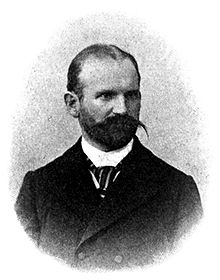
Back روبرت سومر Arabic روبرت سومر (استاذ جامعة من الرايخ الالمانى) ARZ Robert Sommer (Mediziner) German Robert Sommer Polish Robert Sommer Swedish
Karl Robert Sommer | |
|---|---|
 Robert Sommer (1 January 1901) | |
| Born | 19 December 1864 |
| Died | 2 February 1937 (aged 72) |
| Known for | Research on experimental psychology. Co-founder of the „Gesellschaft für experimentelle Psychologie“. Founder of „Deutscher Ausschuss für psychische Hygiene“ in 1923 and „Deutscher Verband für psychische Hygiene“ in 1925 which he also directed until 1933. |
| Spouse | Emmy Schaefer (1867–1935) |
| Awards | Second prize by the Berlin Academy of Sciences, 1886 Elected a member of the Leopoldina, 1936 |
| Scientific career | |
| Fields | Psychiatry |
| Institutions | Humboldt University of Berlin, University of Würzburg, Psychiatric hospital in Rybnik, University of Giessen |

Karl Robert Sommer[1] (19 December 1864, in Grottkau – 2 February 1937, in Giessen) was a german psychiatrist and genealogist born in Grottkau. He is remembered for his work in experimental psychology.[2] He coined the term „Psychohygiene“ in 1901 and founded the „German Association for Psychohygiene“ and the „Society for Experimental Psychology“ (since 1929 „German Society for Psychology“). He is remembered for his work in experimental psychology. He also published on genealogy, philosophy, and forensics. He was also an active inventor and involved in local politics.
- ^ "Robert Sommer". Harvard University - The Collection of Historical Scientific Instruments - People. Retrieved 10 January 2023.
- ^ Sommer, Robert. "This Week's Citation Classic" (PDF). Upenn. Retrieved 10 January 2023.